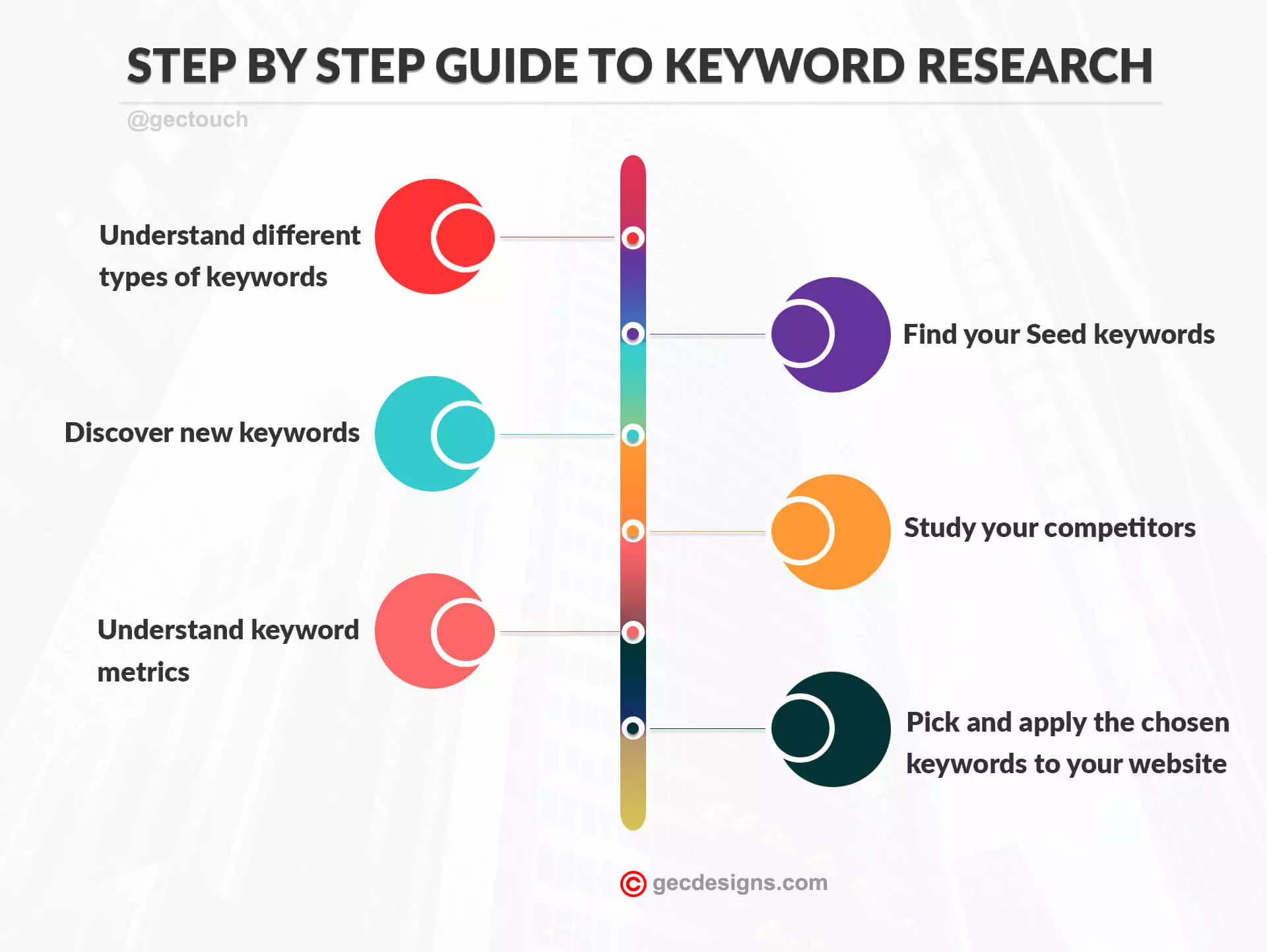To conduct keyword analysis in SEO, start by identifying your target audience and their search queries. Use SEO tools like Google Keyword Planner for insights on search volume and competition.
Keyword analysis is a cornerstone of SEO strategy, demanding attention and precision. It’s the process of finding words and phrases that potential customers use in search engines. Your goal is to optimize your content with these keywords, making your website more visible to your target audience.
This process involves researching, analyzing, and selecting the best keywords to drive traffic to your site. Effective keyword analysis helps you understand market demand, user behavior, and content opportunities. It’s not just about finding the most popular terms; it’s about finding the right terms that match your content and business goals. By focusing on relevant keywords, you can improve your site’s SEO performance, attract more visitors, and ultimately, convert them into customers.
Introduction To Keyword Analysis
Keyword analysis is a big part of SEO. It helps websites rank better. This process finds the best words for your content. Let’s dive into how it works.
The Role Of Keywords In Seo
Keywords are like keys. They unlock the door to top Google spots. Using the right keywords makes your site visible to more people. This means more visitors. And more chances to show what you offer.
- Match user search: Keywords should match what people search for.
- Understand intent: Know why someone searches for these words.
- Use wisely: Place keywords in titles, headers, and content.
Impact Of Keyword Analysis On Digital Marketing
Good keyword analysis changes how well digital marketing works. It shapes your content strategy. This leads to better rankings and more traffic. Here’s how:
- Better targeting: Reach the right audience with precise keywords.
- Content relevance: Create content that answers user queries.
- Competitive edge: Stand out by targeting unique keywords.
Starting With Seo Fundamentals
Keyword analysis is a cornerstone of SEO. It helps your content get found. Before diving into keyword analysis, you must grasp SEO fundamentals.
Understanding Search Engine Algorithms
Search engines use algorithms to rank content. They look for signals to understand what pages offer. Knowing these signals helps you choose better keywords.
- Keywords in titles, headers, and content matter.
- Algorithms consider user experience on your website.
- Backlinks from reputable sites boost your rank.
Importance Of Relevance And Search Intent
Matching keywords to user intent is key. Choose keywords that reflect what users seek. This brings the right visitors to your website.
| Intent Type | Keyword Focus |
|---|---|
| Informational | Guides, How-tos |
| Transactional | Buy, Price, Deals |
| Navigational | Brand or product names |
Preparing For Keyword Analysis
Before diving into keyword analysis, it’s crucial to lay the groundwork. This ensures your SEO efforts align with your objectives. Let’s prepare for this important step in SEO.
Setting Clear Seo Goals
Goals guide your SEO journey. They must be specific, measurable, attainable, relevant, and time-bound (SMART).
- Increase organic traffic by 30% in six months.
- Boost conversions from search visitors by 20% in one year.
- Improve keyword rankings for top 10 industry terms.
Identifying Your Target Audience
Know who seeks your content. Detail their interests, demographics, and search behaviors.
| Aspect | Details |
|---|---|
| Age | 25-45 years old |
| Interests | Technology, Health, Lifestyle |
| Search Behavior | Uses questions, seeks comparisons |
Analyze audience data from analytics tools. Create personas for clarity.

Credit: blog.hubspot.com
Tools Of The Trade
Tools of the Trade are essential for effective SEO. Keyword analysis is no exception. With the right tools, you can uncover what your audience is searching for. This can help tailor your content to meet their needs. Let’s explore the instruments that make keyword analysis a breeze.
Popular Keyword Research Tools
Choosing the best tools is key for keyword discovery. Here’s a list of top tools that SEO professionals use:
- Google Keyword Planner: A classic tool that helps find keywords for your campaigns.
- Ahrefs: Offers detailed keyword reports and niche analysis.
- SEMrush: Provides a comprehensive suite for keyword tracking and research.
- Moz Keyword Explorer: Great for finding keyword opportunities and SERP analysis.
- Ubersuggest: A user-friendly tool for keyword ideas and SEO metrics.
Utilizing Analytics For Keyword Insights
Analytics tools provide valuable data. You can see which keywords bring traffic to your site. Here’s how you can gain insights:
- Analyze your site’s performance data.
- Identify which keywords have high conversion rates.
- Spot trends in user search behavior over time.
Tools like Google Analytics and Google Search Console are perfect for this task. They help you track and improve your keyword strategy.
Conducting Effective Keyword Research
Conducting Effective Keyword Research is a pillar of SEO strategy.
It guides content creation and optimizes visibility. Let’s dive into methods for uncovering powerful keywords.
Brainstorming Initial Keyword Ideas
Start with brainstorming. Consider your audience’s needs.
- Think about potential search queries.
- Use topics relevant to your business.
- Include product or service specifics.
Tools like Google’s Autocomplete aid this process.
List all ideas. They form your keyword foundation.
Analyzing Keyword Difficulty And Search Volume
Next, assess keyword difficulty and search volume.
| Keyword | Difficulty | Search Volume |
|---|---|---|
| Example Keyword 1 | Medium | 1,500/mo |
| Example Keyword 2 | High | 3,000/mo |
| Example Keyword 3 | Low | 500/mo |
Use SEO tools like Ahrefs or SEMrush.
They provide valuable data on keywords.
Aim for high-volume, low-difficulty keywords.
They offer the best chance to rank well.

Credit: gecdesigns.com
Evaluating Competitors’ Keywords
Evaluating Competitors’ Keywords is a smart move in SEO. It helps you understand the market. You learn what works for others. This knowledge guides your keyword strategy. Let’s dive into how to make the most of your competitors’ keywords.
Learning From Competitor Keyword Strategies
Start by identifying your main competitors. Use tools like SEMrush or Ahrefs. These tools show you the keywords your competitors rank for. Look for patterns in their keyword choices. Are they targeting specific phrases or topics? Note these down.
- Spot high-ranking keywords.
- Analyze the content quality.
- Check their backlink profile.
These steps give you insights into why they rank well. Aim to create better content. Improve your backlink profile too.
Finding Keyword Gaps And Opportunities
Keyword gaps are opportunities. These are keywords your competitors missed. Finding these gaps allows you to target new areas.
- Use a keyword gap analysis tool.
- Enter your and your competitors’ domains.
- Discover untapped keywords.
Focus on these untapped keywords. Create content around them. This strategy helps you stand out.
| Strategy | Action | Result |
|---|---|---|
| Analyze Competitor Keywords | Use SEO tools | Understand market trends |
| Find Keyword Gaps | Target new keywords | Attract untapped traffic |
Remember, learning from competitors is key. But always aim to offer unique value. This makes your website stand out in search results.
Keyword Optimization Techniques
Mastering keyword optimization is crucial for SEO. It boosts search rankings. It attracts the right visitors. It’s how websites speak to search engines. Let’s dive into effective techniques.
Integrating Keywords Into Your Content
Seamless integration of keywords into content is key. Start with title tags. Use meta descriptions. Scatter them through headings and subheadings. Include them in the first paragraph. Ensure they appear in image alt texts. Aim for natural inclusion.
Balancing Keyword Density And User Experience
Keyword density matters. It should not compromise readability. Use keywords wisely. Aim for a 1-2% keyword density. This means 1-2 keywords per 100 words. Always write for humans first, search engines second.
| Content Section | Ideal Keyword Placement |
|---|---|
| Title Tag | Primary Keyword |
| Meta Description | Primary and Secondary Keywords |
| Headings | Varied Related Keywords |
| First Paragraph | Primary Keyword |
| Alt Texts for Images | Descriptive Keywords |
Measuring Keyword Performance
Understanding how well your keywords perform is crucial. It helps you refine your SEO strategy. Let’s dive into the methods to track and measure this success.
Tracking Rankings And Traffic
Tracking rankings shows where your pages sit in search results. Use tools like Google Search Console or SEMrush. They provide accurate ranking data. Check your rankings regularly.
- Identify top-performing keywords.
- Note changes in ranking positions.
- Analyze competitors’ keyword performance.
Website traffic indicates keyword relevance. Google Analytics offers insights here. Look at the following metrics:
| Metrics | Significance |
|---|---|
| Pageviews | Shows content popularity. |
| Sessions | Counts visits, reflects engagement. |
| Users | Tracks unique visitors. |
| Bounce Rate | Measures content relevance. |
Adjusting Your Strategy Based On Data
Data shapes successful SEO strategies. Use it to make informed decisions.
- Review ranking and traffic data.
- Identify patterns and trends.
- Focus on high potential keywords.
Boost underperforming content. Optimize titles, headers, and meta descriptions. Include high-traffic keywords. Update old content with new information.
Test different strategies. Monitor changes in performance. Keep content fresh and relevant. This ensures long-term SEO success.
Advanced Keyword Analysis Tactics
Advanced Keyword Analysis Tactics are crucial for SEO success. They go beyond basic keyword research. These tactics help you find the right terms that can boost your site’s visibility. Let’s dive into some sophisticated strategies for keyword analysis.
Exploring Long-tail Keywords
Long-tail keywords are longer phrases that are very specific. They may have lower search volumes. But they often lead to higher conversion rates. This is because they target users who are closer to a point of purchase.
- Use tools like Google’s Keyword Planner or SEMrush.
- Look at competitors’ sites to find niche terms.
- Analyze search queries in your site analytics.
Focus on keywords that match your users’ intent. Users who search long-tail keywords are usually looking for something very specific.
Leveraging Local Seo And Voice Search
Local SEO targets users in a specific area. Voice search is growing with the rise of smart speakers and mobile devices.
| Local SEO Keywords | Voice Search Phrases |
|---|---|
| City or neighborhood names | Long, conversational phrases |
| “Near me” searches | Questions starting with Who, What, Where, When, Why, How |
Include these phrases on your site to appear in local and voice search results.
Remember, users speak differently than they type. Optimize for natural language patterns.
With these advanced tactics, your keyword analysis will reach new heights. Your site will capture the right audience. This audience is ready to engage and convert.
Staying Ahead Of Seo Trends
Staying Ahead of SEO Trends requires a proactive approach. You must update your keyword analysis to match evolving search patterns. Mastering this ensures your website remains visible and competitive.
Adapting To Algorithm Updates
Search engines often change their algorithms. These changes affect how websites rank. To adapt:
- Monitor SEO news for the latest updates.
- Analyze your site’s performance post-update.
- Adjust your keywords based on new ranking factors.
Continuous Learning And Keyword Adaptation
SEO is dynamic. Continuous learning is key. Strategies that worked yesterday may not work today. For keyword adaptation:
- Attend webinars and workshops to stay informed.
- Read industry publications for insights and tips.
- Test new keywords and measure their impact.
Conclusion: The Future Of Keyword Analysis
Keyword analysis is crucial for SEO success. It’s changing fast.
Emphasizing Quality Content And User Experience
Quality content and user experience now lead SEO strategies. Google values how users interact with content. High engagement boosts rankings. This means creating content that answers users’ questions fully and is enjoyable to read.
- Use relevant keywords naturally in your text.
- Make your website easy to navigate.
- Ensure fast loading speeds.
These steps help keep visitors on your site longer.
Anticipating Changes In Keyword Relevance
Keywords evolve as user searches change. Stay ahead by:
- Regularly updating keyword research.
- Observing emerging trends in your industry.
- Using SEO tools to track performance and adapt.
This proactive approach keeps your content relevant and visible.

Credit: www.shoutmeloud.com
Frequently Asked Questions
How To Do Google Keyword Analysis?
To do Google keyword analysis, start by using Google Keyword Planner. Enter your product or service to find related keywords. Analyze search volume and competition levels. Select relevant keywords with high search volume and low competition. Incorporate these into your content strategy for better SEO results.
How Do You Write A Seo Analysis?
To write an SEO analysis, evaluate the website’s keywords, check meta tags, and assess backlink quality. Analyze content relevance, user engagement metrics, and mobile optimization. Identify areas for improvement to boost search engine rankings.
How Do I Use Google Analytics For Seo Keywords?
To use Google Analytics for SEO keywords, link your Google Search Console account. Navigate to the ‘Acquisition’ section, then ‘Search Console’, and review ‘Queries’ to analyze keyword performance and optimize content accordingly.
What Are The 3 Steps To Keyword Searching?
Begin with keyword brainstorming to capture your content’s core ideas. Next, use keyword research tools to refine your list based on search volume and competition. Finally, analyze the intent behind keywords to ensure they align with your content goals.
Conclusion
Mastering keyword analysis is the cornerstone of successful SEO. By identifying the right terms, you enhance your content’s visibility and drive targeted traffic. Embrace the tools and techniques we’ve explored to stay ahead in the digital landscape. Remember, SEO is a journey—consistent keyword analysis paves the path to triumph.


